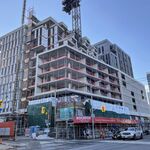Hi,
I haven't had a chance to go through everything but just thought I would put the following out there to gauge responses from forum members:
I'm wondering if there are plans to improve the links between the different lines that are proposed and/or are under construction to provide a more seamless ride for transit users? For example, connecting Finch West LRT and Shepperd East LRT could create one seamless line with the Shepperd East LRT line running north at Don Mills from Shepperd all the way to Finch and then turn west and run all the way to Humber College on Finch.
The Shepperd subway should be extended westward to connect with the Downsview line so there is a link to both legs of the YUS line (i.e. it'll become less of a stub).
With Don Mills station becoming an important link/transfer-point, the DRL should start here (so it is connected to the Shepperd/Finch LRT and the Shepperd subway), go south via Pape through the financial district and king west district and come back north via Dundas West and connect to Jane Street, where it can connect to the future Jane LRT.
With the plan for Jane LRT to connect with Finch LRT, the connection of Jane LRT to the so-called 'downtown relief line' (as per my point above) would enable one massive transit loop covering outer-Toronto via the downtown. This would greatly improve transport in any direction in the city of Toronto, and would particularly help lower-income outer-ring suburbs and highly-dense inner-city suburbs.
This would be in addition to expanding Eglinton crosstown all the way to the airport.
The city of Toronto would then have a one large seamless LRT line covering the north (Shepperd linked in with Finch), a large seamless line covering central Toronto (Eglinton crosstown), the existing south subway line (Bloor-Danforth) and two loop lines - the existing inner Yonge-University-Spadina subway and the new Don Mills-Downtown-Jane line.
I'm assuming that the DRL will be using the LRVs that Eglinton and Shepperd are planning to use so it can be connected to Jane and Don Mills (the only thing being that the DRL portion would be running underground). The current proposal for the DRL is not heavy-rail like the existing subways is it?
Any comments on whether this idea or something similar is being considered and what the time-frame would like should this type of idea materialize? I'm not sure what the cost would be but it should be possible within the $50B 'Big Move' plans I would think?
Thanks in advance.




